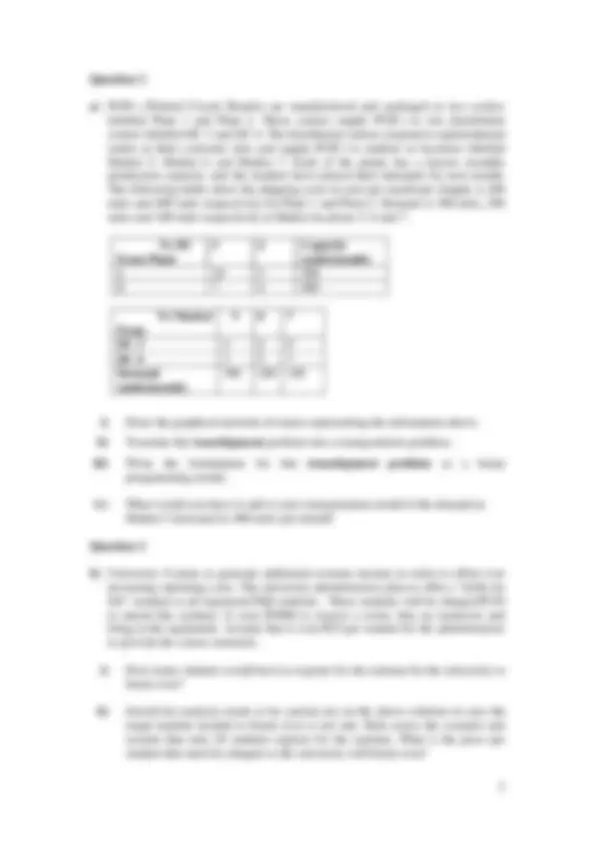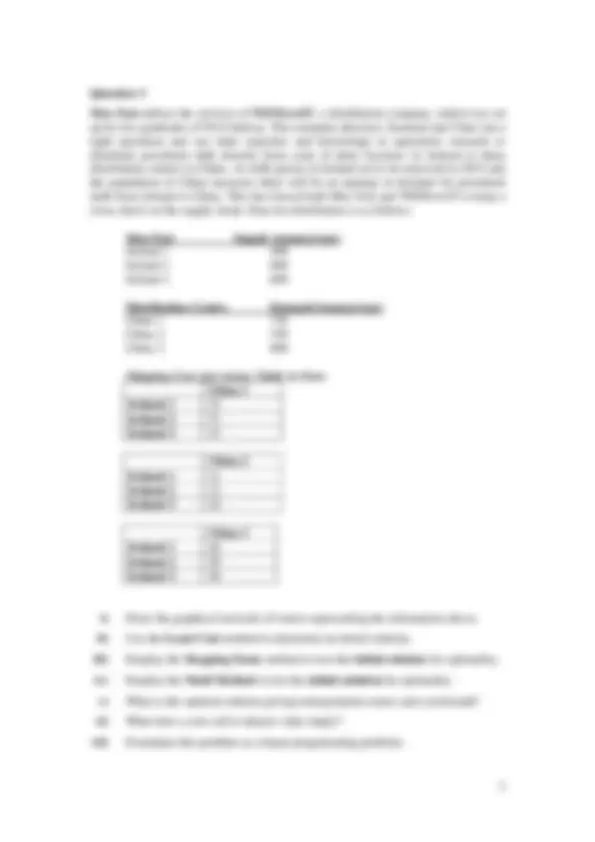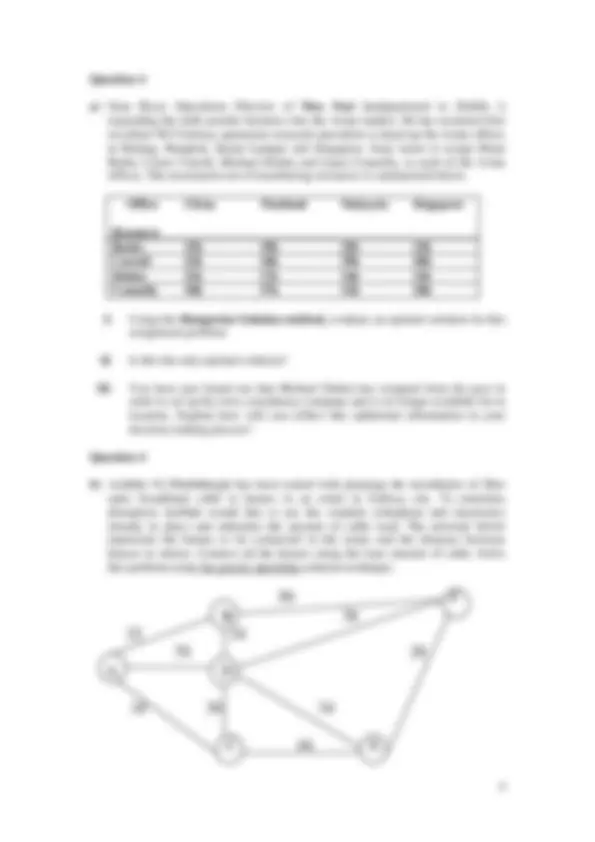





Study with the several resources on Docsity

Earn points by helping other students or get them with a premium plan


Prepare for your exams
Study with the several resources on Docsity

Earn points to download
Earn points by helping other students or get them with a premium plan
Community
Ask the community for help and clear up your study doubts
Discover the best universities in your country according to Docsity users
Free resources
Download our free guides on studying techniques, anxiety management strategies, and thesis advice from Docsity tutors
Main points of this past exam are: Modi Method, Precious Metal, Jewellery Products, Gold Bracelet, Limited Resources, Explicit Objective Function, Decision Variables, Divisible and Nonnegative, Mathematical Terms, Transhipment
Typology: Exams
1 / 6

This page cannot be seen from the preview
Don't miss anything!




Exam Code(s) 1EM1, 3BC1, 4BC2, 4BC5, 4BF1, 1APE1, 1APE2, 2APE1, 2APE2, 1OA1, 3BCM Exam(s) B.Commerce B.Sc. BIS Project and Construction Management M.Appl.Sc Erasmus & Visiting Module Code(s) IE309, IE Module(s) Operations Research Operations Research I Paper No. 1 Repeat Paper External Examiner(s) Dr. Ralph Riedel Internal Examiner(s) *Ms. M. Dempsey
Show all your work clearly and explain your work. All questions will be marked equally. Marks are allocated to explanations, method and solutions. Where you may think that additional information is needed, please clearly state so and make appropriate assumptions and/or use reasonable estimates that will enable you to proceed. Duration (^) 2 Hours No. of Pages Cover + 5 pages College/Discipline Engineering and Informatics/Mechanical and Biomedical Engineering Course Co-ordinator(s) Mary Dempsey Requirements : MCQ Handout Statistical Tables Graph Paper Normal Log Graph Paper Other Material
The recent discovery of the precious metal Au (commonly known as Gold) in Co Leitrim, Ireland and subsequent sale of all gold stock to Bling Co ., a jewellery manufacturer in Galway, has created much needed employment. Bling Co. mixes Gold with an Alloy to create two types of jewellery products. Product A is a 9ct gold bracelet and Product B is an 18ct gold bracelet. Manufacturing the bracelets takes different amounts of alloys and time. The expected profit is €1,500 per unit for Product A and €2,700 per unit for Product B. There is a limited amount of 15 units of Gold available and 10 units of the Alloy available. There are only 10 units of manufacturing time available. Below is a table of the resources involved in the manufacture of each product. Input Product A (units) Product B (units) Gold 4 12 Alloy 5 2 Manufacturing time 3 5 The formulation of this problem should satisfy four requirements for standard LP a) There are limited resources and there is an explicit objective function b) The equations are linear c) The resources are homogenous (everything is in one unit of measure) d) The decision variables are divisible and nonnegative (we can make a fractional part of each bracelet) i) Illustrate this scenario ii) Formulate the problem in Mathematical Terms as a Linear Programming Problem iii) Graph this problem using X 1 and X 2 co-ordinate planes iv) Find the optimal mix of bracelets to be produced using the simplex method v) If it were deemed undesirable to make a fractional part of a bracelet what technique would you use? vi) What resource or product issues face Bling Co. vii) Give five application area examples where LP is commonly used.
Moo Fast utilises the services of WEMoveIT , a distribution company, which was set up by two graduates of NUI Galway. The company directors, Eamonn and Clare run a tight operation and use their expertise and knowledge in operations research to distribute powdered milk directly from each of three factories in Ireland to three distribution centres in China. As milk quotas in Ireland are to be removed in 2015 and the population of China increases there will be an upsurge in demand for powdered milk from Ireland to China. This has forced both Moo Fast and WEMoveIT to keep a close check on the supply chain. Data for distribution is as follows: Moo Fast Supply (tonnes/year) Ireland 1 500 Ireland 2 800 Ireland 3 600 Distribution Centre Demand (tonnes/year) China 1 750 China 2 350 China 3 800 Shipping Cost (per tonne) Table in Euro China 1 Ireland 1 33 Ireland 2^31 Ireland 3 15 China 2 Ireland 1 21 Ireland 2 12 Ireland 3 24 China 3 Ireland 1 26 Ireland 2^20 Ireland 3 30 i) Draw the graphical network of routes representing the information above. ii) Use the Least Cost method to determine an initial solution. iii) Employ the Stepping Stone method to test the initial solution for optimality. iv) Employ the Modi Method to test the initial solution for optimality. v) What is the optimal solution giving transportation routes and cost/month? vi) What does a zero cell evaluator value imply? vii) Formulate this problem as a linear programming problem.
a) Sean Barry Operations Director of Moo Fast headquartered in Dublin is expanding the milk powder business into the Asian market. He has recruited four excellent NUI Galway operations research specialists to head up the Asian offices in Beijing, Bangkok, Kuala Lumpur and Singapore. Sean wants to assign Brian Burke, Conor Carroll, Michael Diskin and Laura Connolly, to each of the Asian offices. The associated cost of transferring resources is summarised below. Office Resource China Thailand Malaysia Singapore Burke 15k 19k 25k 23k Carroll 22k 18k 29k 20k Diskin 31k 17k 14k 15k Connelly 18k 37k 12k 10k i) Using the Hungarian Solution method, evaluate an optimal solution for this assignment problem ii) Is this the only optimal solution? iii) You have just found out that Michael Diskin has resigned from his post in order to set up his own consultancy company and is no longer available for re location. Explain how will you reflect this additional information in your decision making process? Question 4 b) Aoibhin Ni Dhubhthaigh has been tasked with planning the installation of fibre optic broadband cable to homes in an estate in Galway city. To minimise disruption Aoibhin would like to use the conduits (telephone and electricity) already in place and minimise the amount of cable used. The network below represents the homes to be connected in the estate and the distance between houses in metres. Connect all the houses using the least amount of cable. Solve this problem using the greedy algorithm solution technique.